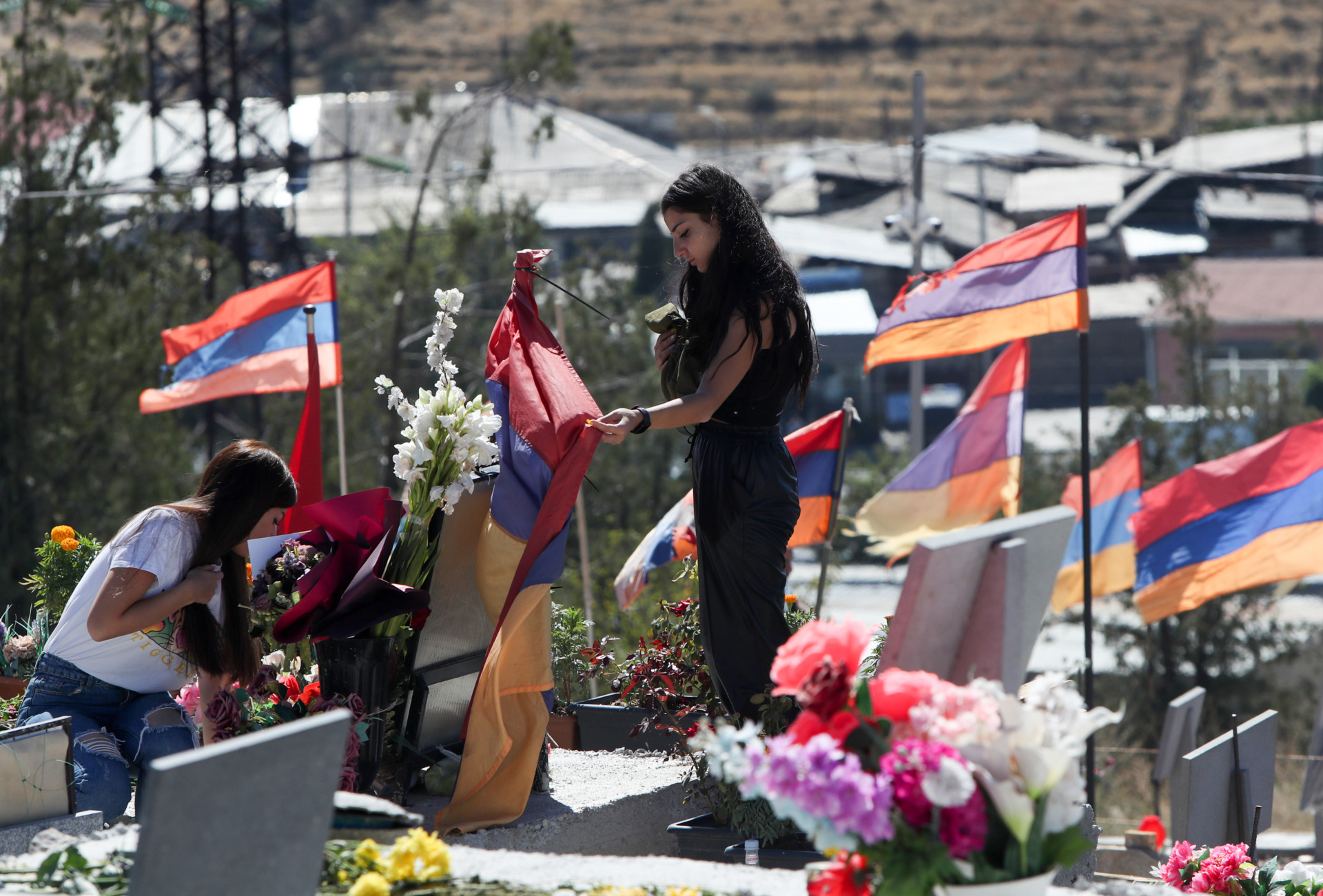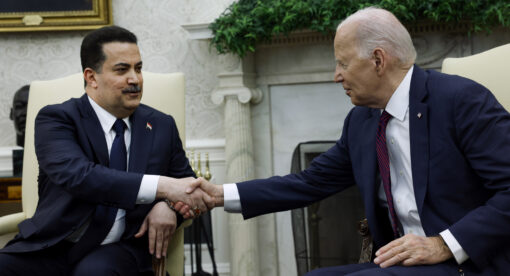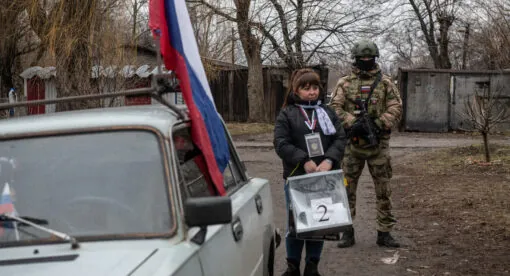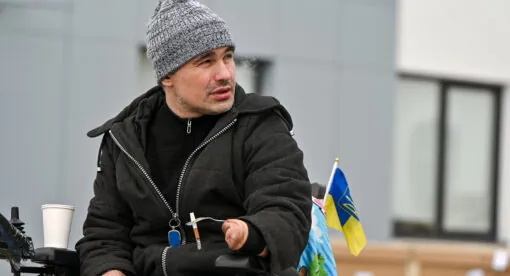After its decisive victory in the 2020 war with Armenia over Nagorno-Karabakh, Azerbaijan has begun to further escalate tensions in the region with a military push into Armenia proper.
Azerbaijan and Armenia have long contested the disputed territory of Nagorno-Karabakh, the ethnic Armenian-majority enclave over which two full-scale wars have been fought in the past 30 years. Following Azerbaijan’s victory in 2020, however, Baku has begun to push its territorial claims on parts of the Republic of Armenia itself – a dangerous element of Azerbaijan’s attempts to force a capitulating treaty on Armenia as Azerbaijani troops press into the country from three directions.
The 44-day Second Karabakh War ended with a decisive Azerbaijani victory on Nov. 10, 2020, that saw Baku regain three-quarters of the lands previously held by ethnic Armenian forces, largely reversing Armenia’s and the breakaway Republic of Artsakh’s 1994 victory. In the months since, the decades-long conflict has entered a new and risky phase, with Azerbaijan militarily pressing territorial claims as part of a strategy to force Armenia to a comprehensive political deal on its terms. The U.S. has a clear interest in exercising its significant influence on the region to halt the current process before Baku goes further.
Under President Ilham Aliyev, who took power following his father’s death in 2003, Azerbaijan has increasingly laid claim to part or all of the Republic of Armenia. At least as far back as 2010, Aliyev referred to present-day Armenia as “our historic land.” These claims invoke the existence of the Erivan Khanate, an 18th-century Iranian vassal state, as evidence that Armenia is historical Azerbaijani territory. This rhetoric is coupled with the ahistorical narrative that the Armenian population of today’s Republic of Armenia is the result of Russian imperial resettlement policies, intended to replace the region’s indigenous ethnic Azeri Turkish population with pliant Christian Armenian aliens. This narrative increasingly became a core part of Aliyev’s fundamental ideology for Azerbaijan, a view that was an inalienable part of the country’s identity and that some form of return there was inevitable. It has also been the core pillar of Aliyev’s determination in the postwar period to keep the focus on the “external enemy” of Armenia and away from internal social and economic issues that could threaten his rule.
Dangerous Recent Developments
In recent months, Azerbaijan’s quasi-irredentism has reached new heights. Aliyev stated at Azerbaijan’s victory parade in December that Yerevan, Armenia’s capital, and southern Armenia are “historic Azerbaijani lands.” He has repeatedly reiterated such narratives in the following months while threatening to open the “Zangezur corridor,” a disputed provision of the Nov. 10 cease-fire deal, by force. Most recently, Azerbaijani and Turkish troops held joint military exercises – their first since the end of the war – in Azerbaijan’s Lachin district, a highly strategic and sensitive area recaptured last October that separates Armenia from Karabakh.
But while these claims in the past were mere rhetoric, something that could be easily dismissed as pandering to a domestic constituency, recent events have made them much more alarming. On May 12, Azerbaijani troops crossed the international border into Armenian territory in two separate areas: one in Armenia’s southeastern Syunik province, the other in its northeast province of Gegharkunik, where they continue to occupy Armenian territory. Multiple Armenian servicemen have since been killed in clashes, and at least six have been taken prisoner by Azerbaijani troops.
In mid-July, the area of provocations widened to Armenia’s other border with Azerbaijan: the Azeri exclave of Nakhchivan. There have been reports on social media that Azerbaijani troops have advanced in the area, or at least have tried to – a feasible claim considering that Azerbaijan holds the high ground. Russia has a strong military presence in Armenia and is bound to defend its ally’s territorial integrity by Article 4 of the Collective Security Treaty Organization, but Moscow has demurred, raising the question of how far it will allow Azerbaijan to go. There is little doubt that at some point Russia will step in to halt Azerbaijan, but the uncertainty of where that line lies makes the risk of miscalculation and unplanned escalations worse.
Forecast
All indications are that Azerbaijan will escalate military actions on Armenian territory. As Caucasus scholar Laurence Broers recently described, likely the primary reason Aliyev is pushing this narrative now is as a counterpoint to the Karabakh issue. Azerbaijan will then offer to drop its claims to Armenian territory, especially “West Zangezur” (Armenia’s Syunik province) in exchange for Yerevan recognizing Azerbaijan’s territorial integrity and therefore abandoning Karabakh entirely. Combined with continued military activity against Armenia itself, Baku hopes this pressure will result in an unconditional Armenian capitulation on its terms – otherwise, as Aliyev himself has stated, Azerbaijan’s actions will continue. While Azerbaijan’s efforts are likely directed toward securing a treaty by which Armenia will recognize and allow its control over all of Karabakh, exerting physical control over Armenian territory is a favorable outcome for Aliyev in its own right, providing both additional leverage and humiliating Yerevan as its ally Russia continues to decline to come to its defense.
This strategy is both dangerous and misguided. Such a demand – to merely hand Karabakh to Azerbaijan – is an obvious nonstarter for both the Armenian government and society. It has similarly been categorically rejected by all three of the OSCE Minsk Group co-chairs, with Russia, France and the U.S. repeatedly reminding Aliyev that the Karabakh issue is not “resolved,” as he likes to say, but that the final status of the territory will only be determined under OSCE auspices. Russia, whose role is particularly important given Moscow’s control of events on the ground, has explicitly said that Karabakh’s status is years away from being determined. Curiously, with the possible exception of the joint exercises in Lachin earlier this month, Turkey has been almost entirely absent from these developments, providing no diplomatic or rhetorical support to Azerbaijan’s push while openly exploring renewing relations with Armenia, suggesting that Ankara and Baku may be on different pages on the issue.
Given these circumstances, the most likely outcome of Baku’s current maximalist approach is to push the region toward renewed full-scale warfare. Already both Armenian and Azerbaijani servicemen are being killed weekly as a result of Aliyev’s insistence on this destructive approach. There are meanwhile further dangers that could come to pass if Azerbaijan continues. As easy as it is to dismiss Aliyev’s irredentist language as mere posturing, it would not take much for his territorial claims to become reality: Clashes are already occurring daily, and unplanned escalations could easily spiral out of control. Russian peacekeepers, deployed across Karabakh and in areas of southern Armenia, have yet to materialize in either of the currently contested areas after four months despite much talk of their deployment, for reasons unclear. Any escalation in this direction – say, by Azeri forces occupying one or more actual settlements in Armenia – would have devastating consequences for regional stability.
Recommendations
Washington was absent last year during the Second Karabakh War, which came in the decisive weeks of the election campaign, and it ceded much of its remaining influence over the Karabakh issue to Moscow as a result. Now, with the Biden administration looking to reengage on the conflict (something State Department officials restated in a Sept. 21 conference call), the timing of Baku’s aggression against Armenia itself could hardly provide a more auspicious opportunity to do so.
The U.S. rhetorical response to some of these developments has been unequivocal. A State Department spokeswoman stated May 15 that Azerbaijan must immediately leave Armenian territory, while National Security Advisor Jake Sullivan telephoned Aliyev on May 18 to further underscore the impermissibility of Baku’s actions. U.S. Ambassador to Armenia Lynne Tracey has meanwhile been active in the country, traveling regularly to observe Azerbaijani-occupied regions in Syunik and Gegharkunik.
It is clear, however, that the U.S. needs to add material consequences to its warnings for Baku to heed them, with Aliyev stating in late July that Azerbaijan has no intention of vacating the lands it has seized. The Biden administration’s approval on May 21 of additional military funding for Azerbaijan, ostensibly to combat its southern neighbor Iran, has been taken in Baku as a sign that Washington does not strongly object to its active military advances against Armenia. This funding was received following the waiver of Section 907 of the Freedom Support Act – and could be reversed if the U.S. were to reimpose it, which would serve as a strong signal to Baku that its actions to inflame conflict will not be tolerated. An amendment banning U.S. military aid to Azerbaijan was passed in the U.S. House on July 28 but must still pass the Senate before becoming law.
The U.S. has furthermore not been hesitant to impose targeted sanctions against other malign actors in the region, including Azerbaijan’s neighbors Russia and Iran (and possibly even soon to include Georgia, heretofore a Western darling); such measures directly against the Aliyev regime would further demonstrate the U.S. resolve to establish peace in the Caucasus, and pressure against Turkey to rein in its destabilizing junior partner could also yield results.
Security cooperation and military aid to Yerevan should not be out of the question. Armenia is a close Russian ally, but it maintains strong ties with the EU and U.S. as well and has participated in the NATO Partnership for Peace since 1994, providing a framework for further strengthening security cooperation. Credibly threatening to suspend Azerbaijan’s participation in that program is another potential lever for Washington that could signal to Baku that tangible consequences could result if it continues to escalate.
One of the primary U.S. goals in the region has long been democracy promotion, a cause that makes another compelling case for supporting Armenia. This rationale has been a driving factor behind nearly two decades of strong U.S. relations with Armenia’s northern neighbor, Georgia, but now merits a recalculation: Armenia has actually outscored Georgia’s democratic credentials for the past two years now, according to the Economist Intelligence Unit’s Democracy index. Armenia’s remarkably fair and democratic national election in June was further proof of the country’s rapid development away from its autocratic past, something the EU recognized upon agreeing to finance Armenia with a billion more euros in upcoming programming than was initially planned.
Azerbaijan, meanwhile, could not be more on the contrary: a tightly controlled authoritarian state ruled by a hereditary dynasty that ranks as one of the world’s least free. Armenia’s status as a Russian treaty ally complicates matters but not prohibitively so: The U.S. has worked closely with Central Asian nations like Kazakhstan and Kyrgyzstan, also CSTO members, over the past two decades with little issue. If supporting free and democratic societies is truly a U.S. foreign policy priority, then supporting a fledgling but dynamic democracy like Armenia against military aggression by a dictatorship should be an unquestionable choice. Otherwise, with Azerbaijan continuing its military pressure on Armenia to accept an unacceptable peace treaty, the region will continue to backslide toward war.
Neil Hauer is a Canadian journalist and analyst based in Yerevan, Armenia. Hauer writes on Russia, Syria, and the Caucasus (both North and South). Follow him at @NeilPHauer.
The views expressed in this article are those of the author and not an official policy or position of the Newlines Institute.







